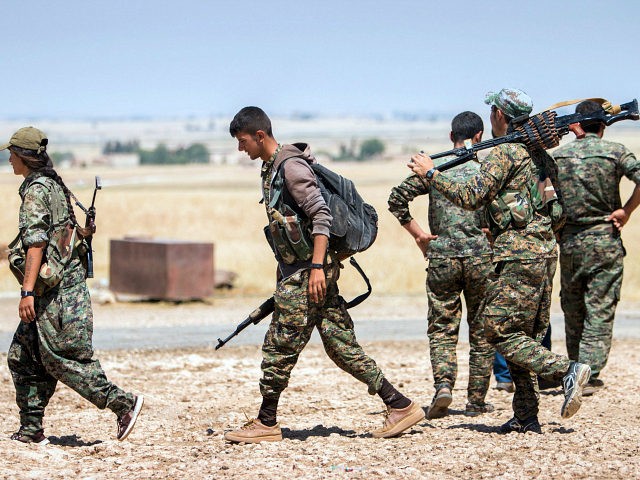The Turkish military actively engaged in gunfire with the Syrian Kurdish People’s Protection Units (YPG), long considered among the most successful militias on the ground fighting the Islamic State.
Turkey considers the YPG, its female component the YPJ, and any advocates for an independent Kurdistan terrorist entities as worthy of attack as the Islamic State.
Turkey’s military released a statement Tuesday claiming to have killed one YPG fighter near the Syrian border with the Turkish province of Mardin.
Official statements from the YPG confirm “violent” attacks on their territory from Turkish forces near the border, at least two of them occurring on Tuesday. The Kurdish outlet Rudaw notes that the YPG denied the death of any of its fighters, instead claiming that the YPG “damaged” Turkish vehicles and protesting that Turkey had “violated” the sovereignty of Rojava, which the YPG considers the Syrian region of Kurdistan.
The YPG seeks not only to defeat the Islamic State, but to establish a free and sovereign Kurdistan in a heartland region containing parts of Syria, Turkey, Iran, and Iraq.
According to the Turkish newspaper Hurriyet, in addition to the YPG fighter, Turkish soldiers claimed to have killed, injured, or captured 26 Islamic State jihadis. Prime Minister Binali Yıldırım issued a statement also claiming that Turkish soldiers and their allies in the Free Syrian Army (FSA), a mostly Arab anti-Syrian government militia, now “largely” controlled al-Bab, currently held by the Islamic State.
“Al-Bab has largely been taken under control. Our aim is to prevent the opening of corridors from territories controlled by terrorist organizations to Turkey. Our efforts from the start have not been for nothing, we have reached our aim,” Yıldırım said.
The YPG/YPJ have long served as reliable allies of the United States in Syria, sending the U.S. military ground intelligence to inform which locations to conduct airstrikes over. YPG leaders say the United States has tapped them to help with the liberation of Raqqa, the “capital” of the Islamic State caliphate. Additionally, some American citizens, among other Westerners, have joined the YPG on the ground as volunteer fighters.
Turkey considers the YPG/YPJ indistinguishable from the Kurdistan Workers’ Party (PKK), a U.S.-designated Marxist terrorist group. In addition to operating within Turkey, the PKK has spread throughout northern Iraq, engaging in battles with the Islamic State.
The Turkish state-run Anadolu Agency ran a story Monday quoting Turkey’s deputy prime minister as warning the United States yet again to disengage with the YPG. “If you said, ‘We’ll liberate Raqqa but replace it [Daesh] with the PYD/YPG,’ this would create a first-degree national security threat to Turkey,” Numan Kurtulmus reportedly said. Turkey instead recommends partnering with the FSA. The Obama administration repeatedly tried and failed to vet the fighters comprising the FSA, many of whom eventually returned to jihadist activity.
The YPG came up during talks between President Donald Trump and his Turkish counterpart, Recep Tayyip Erdogan, last week. “Erdogan… highlighted the importance of countering the PKK and stressed that U.S. should not support the PYD/YPG,” Anadolu Agency reported. The phone conversation also resulted in Trump sending CIA director Mike Pompeo to Ankara for talks on combatting the Islamic State, where various Turkish leaders once again lobbied for the United States to abandon its longtime ally in Syria.
Erdogan deployed Turkish troops in Syria last year, initially as a way to combat the growing terror threat within his borders. Erdogan later claimed he sent troops there “to end the rule of the tyrant al-Assad who terrorizes with state terror,” not to fight the Islamic State. He ultimately modified his statement to claim that the Turkish invasion meant to target “only terror organizations,” without specifying whether he considered the Assad government one such group.

COMMENTS
Please let us know if you're having issues with commenting.